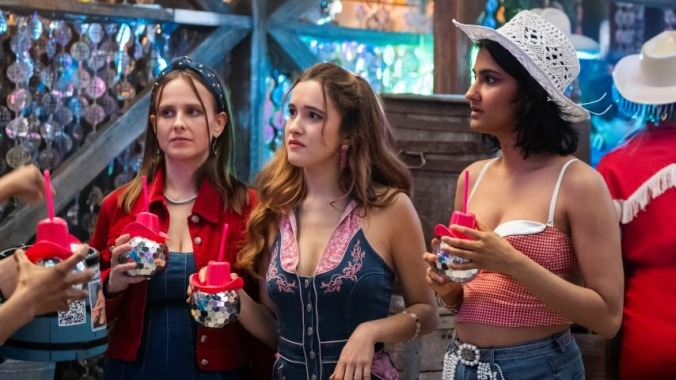The Sex Lives of College Girls Season 3 Falls Flat

Mindy Kaling is known for her chaotic women, whether she is directly embodying them via The Mindy Project and The Office, or they’re figments of her imagination brought to life on screen like in Never Have I Ever. The latest season of The Sex Lives of College Girls proves to be no exception. Season Three’s shenanigans should come as no surprise—despite the nearly two years we had to wait for it—but it’s possible that after so many years of the same, her characters and their decisions are growing a little tired.
Last season ended with Bela (Amrit Kaur) wanting to transfer colleges because she cheated on her boyfriend, Eric (Mekki Leeper), and got booted from her own all-female comedy magazine; Kimberly (Pauline Chalamet) and Whitney (Alyah Chanelle Scott)’s friendship is on the rocks because Kimberly kissed Whitney’s ex-boyfriend; and Leighton (Renee Rapp) got back with her ex-girlfriend, Alicia (Midori Francis).
Season Three opens with the core four returning to Essex College for their sophomore year. It’s a bit of a shock for several reasons to hear the girls talking excitedly about their second year at college and to watch them move back into the dorms. For one, all the actresses look far beyond the typical age of a college sophomore (19); Renee Rapp is the only one even relatively close at 24, with the other three being well into their early thirties. Jarring still about this only being their second year at Essex is that four years have now passed since the first season’s release. It’s a bit counterintuitive to how T.V. seasons equate to years passing in shows like this.
They do a relatively decent job of catching us up on the goings-on of Season 2 without being too heavy-handed in their exposition, and so everything makes some sort of sense as it unravels. Unfortunately, the storytelling isn’t as cohesive as it could be. Nearly every scene seems to be transitioned to the next by way of—admittedly beautiful—shots of the college campus, over which disco/club type music is played. This is not a new creative choice, but it feels even more disjointed after spending so long apart from the show.
This season does a good job of respectfully and thoughtfully depicting bisexuality and showing the detriment of casual substance abuse. Season 3 gets a bit more serious, with some plot lines dealing with sensitive subject matter that the previous two seasons didn’t necessarily touch. The characters and the way they struggle with these deeply personal, lifelong issues feels realistic and does not play to stereotypes.
Yet, these issues that should be major, pivotal scenes are usually wrapped up within the span of an episode, if that. Sometimes, it’s over the span of one to two scenes. It feels very unrealistic. We don’t stay with these character problems and don’t develop them long enough to make the audience care as deeply about them as they probably should. In fact, we spend so little time on them that it’s likely the audience will forget some of them when the opening credits to the next episode roll.
Also, Sex Lives tendency towards sensory overload in any given scene is a bit grating, and often leads to a kind of tonal whiplash. Make no mistake: I am a firm believer in shows that just want to have fun, because not every show has to be dour and serious, nor does every show need to vie for an Emmy nom. That said, the stark juxtaposition of techno club music, flashing lights, and pre-gaming scenes against the quieter, more emotional moments do not flow well.
The sheer number of varying storylines for each girl isn’t quite helped by the sudden bloating of the cast, either. It appears that with Renee Rapp’s exit, they have decided to add two new main characters to their roster: Taylor (Mia Rodgers), an edgy new freshman from London, and Kacey (Gracie Lawrence), an unexpected newcomer to the girls’ friend group. (This doesn’t include the other characters they’ve added in the sheer number of copious new love interests.)
-

-

-

-

- Curated Home Page Articles By Test Admin October 21, 2025 | 3:10pm
-

- Curated Home Page Articles By Test Admin October 21, 2025 | 2:57pm
- Urls By Test Admin October 21, 2025 | 2:57pm
- Curated Home Page Articles By Test Admin October 21, 2025 | 2:55pm
-

-

-

-

-

-

-

-

-

-

-

-

-

-

-

-

-

-

-

-

-

-

-

-

-

-

-

-

-

-

-




































